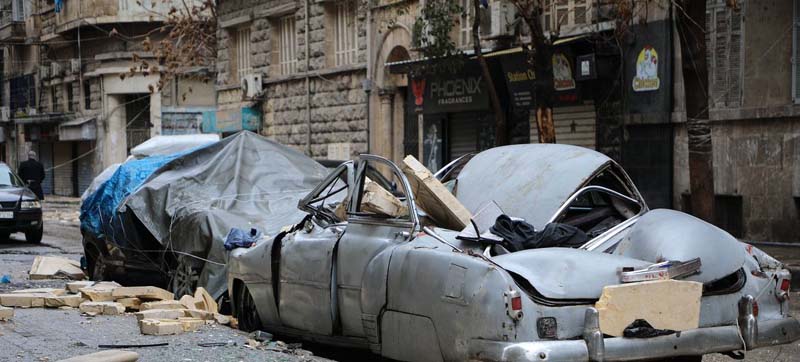Children sleep in streets, too afraid to go home after quake disaster

New York: As UN aid convoys prepared to deliver more relief to quake-hit northwest Syria via two additional land routes from Türkiye on Tuesday, UN humanitarians warned that many thousands of children have likely been killed, while millions more vulnerable people urgently need support.
“Even without verified numbers it's tragically clear the number of children killed, the number of children orphaned is going to keep on rising",” said UN Children’s Fund (UNICEF) spokesperson James Elder.
The @UN and humanitarian partners call for US$397.6 million to provide emergency relief to 4.9 million people in most acute need following the devastating earthquakes.
In Türkiye, the total number of children living in the 10 provinces before the emergency was 4.6 million, and 2.5 million in Syria.
Growing health threat
And as the humanitarian focus shifts from rescue to recovery, eight days since the disaster, Mr. Elder warned that cases of hypothermia and respiratory infections were rising among youngsters, as he appealed for continued solidarity with all those affected by the emergency.
“Everyone, everywhere, needs more support, more safe water, more warmth, more shelter, more fuel, more medicines, more funding,” he said. “Families with children are sleeping in streets, malls, mosques, schools, under bridges, staying out in the open for fear of returning to their homes.”
Crossline access challenge
Despite the welcome reports that Syrian President Bashar al-Assad agreed with the UN to reopen two additional cross-border aid delivery points into quake-hit northwest Syria from Türkiye at Bab Al-Salam and Al Ra’ee for an initial three months, UN humanitarians stressed the need to secure aid relief safe passage guarantees from all those involved in Syria’s more than 12-year-old civil war.
“Every party has to agree to receive convoys to let them go unhindered and that is the biggest challenge,” said Christian Lindmeier, spokesperson for the World Health Organization (WHO).
People need help, ‘wherever they are from’
Echoing that message from Damascus, Kenn Crossley, World Food Programme (WFP) Country Director in Syria, told journalists in Geneva that humanitarian access needed to reach people “wherever they are from, wherever we can get to them”.
DONATE!
Emergency and search-and-rescue teams have deployed to assess and prioritize urgent needs and to provide life-saving assistance following the devastating earthquake near the Türkiye-Syria border.
Highlighting the UN’s considerable efforts to provide relief to those directly affected by the emergency, the WFP official noted that hot meals and ready-to-eat food had been distributed in shelters within hours of the disaster, using pre-positioned stocks.
“Roughly 90,000 people within northwest Syria have been receiving specific food assistance related directly to the impact of the earthquake,” he said, adding that up to double that number were receiving regular assistance linked to the ongoing conflict.
Aid for all
WFP has also provided food assistance to 60-70,000 quake-affected people in Government-controlled areas of Aleppo, Hama, Latakia, Mr. Crossley continued, which is in addition to the assistance that the UN agency provides “in unfortunately exactly the same areas through our regular programmes”.
Another key player in the relief effort, the UN migration agency, IOM, said that 11 trucks packed with aid relief had been dispatched on Tuesday to northwest Syria’s Bab Al-Salam, one of the reopened border crossings, while another four lorries left the UN’s aid hub in Gaziantep bound for Bab al-Hawa.
Convoy latest
The latest convoys are in addition to the 58 trucks loaded with aid provided by six UN agencies that reached northwest Syria from Turkiye as of 13 February, according to aid coordinating agency OCHA.
In its latest situation report for Turkiye, WHO Regional Director for Europe, Dr. Hans Kluge said that well over 31,000 people had lost their lives in the disaster. The number of injured in the 10 affected southern provinces had risen to almost 100,000.
Across the border in northwest Syria, Dr. Kluge assessed the death toll at nearly 5,000 but “all of these figures will likely rise”, he told journalists.
Rising by the hour
“The needs are huge, increasing by the hour. Some 26 million people across both countries need humanitarian assistance,” the WHO official insisted.
As part of its response, the UN health agency has supported efforts to prevent emerging health issues linked to the cold weather, hygiene and sanitation, and the spread of infectious diseases.
In Türkiye, an estimated one million people have lost their homes and are living in temporary shelters, Dr Klug continued, citing Turkish authorities’ estimates that 80,000 people are in hospital, “placing a huge strain on the health system, itself badly damaged by the disaster”.



